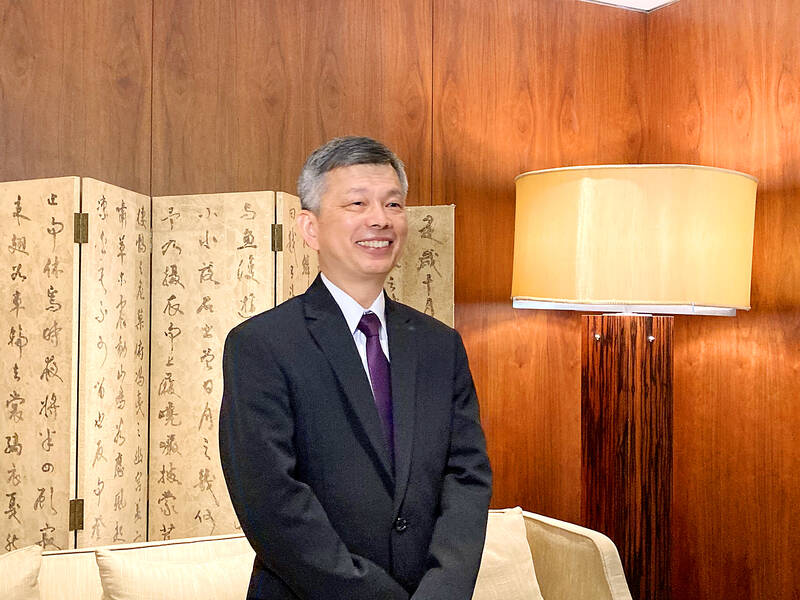Wafer probing service provider Chunghwa Precision Test Technology Co (中華精測) yesterday said it aimed to grow revenue by a double-digit percentage this year, benefiting primarily from rising demand for artificial intelligence (AI) and high-performance computing chips.
Increasing demand for products ranging from AI-enabled servers to edge devices with AI features such as smartphones, PCs and notebook computers are stimulating demand for the company’s advanced wafer probing services, boosting probe card revenue, Chunghwa Precision Test Technology president Scott Huang (黃水可) said.
“We are seeing exuberant development of the AI industry,” Huang said. “Adding AI features to smartphones and PCs is igniting new growth momentum. Forecasts by customers show that 2024 will be better than 2023, that is for sure.”

Photo: Lisa Wang, Taipei Times
The probing card business would be a major growth area this year, as the firm has secured new customers that develop smartphone chips, SSD controllers and Wi-Fi 7 chips, the company said.
As a result, Chunghwa Precision Test Technology is targeting a more than 40 percent increase in its probe card revenue contribution this year from 33 percent last quarter, Huang said.
Gross margin is expected to rebound to its normal range of between 50 and 55 percent this year, as the probe card business has better margins, he said.
The company’s gross margin improved to 49.8 percent last quarter from 48.8 percent in the third quarter last year, but is down from 51.1 percent last quarter.
Chunghwa Precision Test Technology focuses on designing and manufacturing printed circuit boards for semiconductor testers, such as load boards for final testing and probe cards for wafer probing.
With the industry’s inventory correction cycle approaching its end, the firm expects a lukewarm pickup in the first half, Huang said.
There is a lack of clear signs indicating a full recovery of demand for electronics, he said.
China, with its slowing economy and troubled property market, and Europe have shown weakness in electronics spending, he said.
“Consumer consumption is a major concern,” Huang said. “We have not seen spending on electronics coming back yet. Rather, people are spending their money on travel and luxury bags.”
The growth momentum would pick up in the second half of this year, he said.
Net profit surged 60.28 percent sequentially to NT$17.47 billion (US$554.74 million) last quarter, compared with NT$10.9 billion in the third quarter last year, marking the third straight quarter of profit and the best quarterly earnings last year as the company and its customers battled a prolonged inventory correction and sluggish demand.
The company’s operating profit was NT$15.51 million last quarter, reversing an operating loss of NT$17.24 million a quarter earlier.
Last year as a whole, Chunghwa Precision Test Technology booked an operating loss of NT$52.72 million.
Net profit plummeted about 96 percent to NT$29.5 million last year from NT$782.57 million in 2022, the weakest annual net profit since 2012.
Earnings per share dipped to NT$0.99 last year from NT$23.5 the prior year.

NEW IDENTITY: Known for its software, India has expanded into hardware, with its semiconductor industry growing from US$38bn in 2023 to US$45bn to US$50bn India on Saturday inaugurated its first semiconductor assembly and test facility, a milestone in the government’s push to reduce dependence on foreign chipmakers and stake a claim in a sector dominated by China. Indian Prime Minister Narendra Modi opened US firm Micron Technology Inc’s semiconductor assembly, test and packaging unit in his home state of Gujarat, hailing the “dawn of a new era” for India’s technology ambitions. “When young Indians look back in the future, they will see this decade as the turning point in our tech future,” Modi told the event, which was broadcast on his YouTube channel. The plant would convert

‘SEISMIC SHIFT’: The researcher forecast there would be about 1.1 billion mobile shipments this year, down from 1.26 billion the prior year and erasing years of gains The global smartphone market is expected to contract 12.9 percent this year due to the unprecedented memorychip shortage, marking “a crisis like no other,” researcher International Data Corp (IDC) said. The new forecast, a dramatic revision down from earlier estimates, gives the latest accounting of the ongoing memory crunch that is affecting every corner of the electronics industry. The demand for advanced memory to power artificial intelligence (AI) tasks has drained global supply until well into next year and jeopardizes the business model of many smartphone makers. IDC forecast about 1.1 billion mobile shipments this year, down from 1.26 billion the prior

People stand in a Pokemon store in Tokyo on Thursday. One of the world highest-grossing franchises is celebrated its 30th anniversary yesterday.

Zimbabwe’s ban on raw lithium exports is forcing Chinese miners to rethink their strategy, speeding up plans to process the metal locally instead of shipping it to China’s vast rechargeable battery industry. The country is Africa’s largest lithium producer and has one of the world’s largest reserves, according to the US Geological Survey (USGS). Zimbabwe already banned the export of lithium ore in 2022 and last year announced it would halt exports of lithium concentrates from January next year. However, on Wednesday it imposed the ban with immediate effect, leaving unclear what the lithium mining sector would do in the